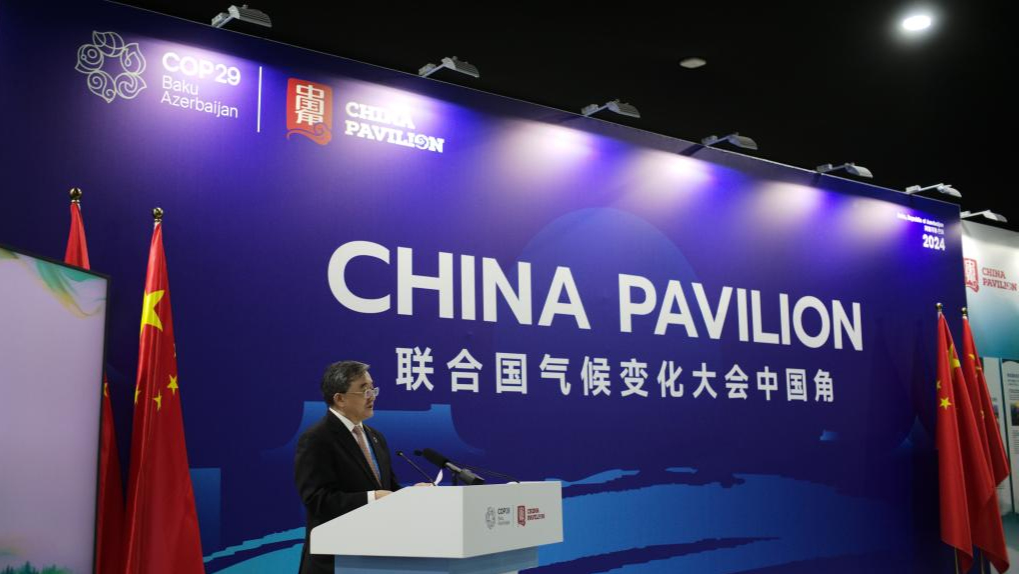
The COP29 United Nations climate change conference went into a stalemate on Friday, its scheduled conclusion date, with key concerns from developing countries largely unaddressed.
A key task of the UN gathering, which kicked off on Nov 11 in Baku, Azerbaijan, is to establish a post-2025 climate finance commitment from developed nations to developing countries, building on the previous pledge of $100 billion per year.
The commitment is officially known as the New Collective Quantified Goal, or NCQG.
READ MORE: Chinese envoy: Developed countries key to climate finance
In the latest draft of the negotiation text, which was made public in the early hours of Thursday, there was an unresolved placeholder 'X' on how much climate finance developed nations must provide and mobilize.
After being asked to comment on a proposed $200 billion NCQG in a news conference on Wednesday, delegates from developing countries offered a brief but dismissive answer.
"Is this a joke?" asked Diego Pacheco from Bolivia, speaking on behalf of Like Minded-Group of Developing Countries, or the LMDC.
His incredulous tone sparked laughter throughout the news conference. Adonia Ayebare of Uganda, speaking for the Group of 77, repeated the rhetorical question, eliciting another round of chuckles.
Ali Mohamed from Kenya, on behalf of the African Group of Negotiators, stressed that the $200 billion suggested by the journalist was far from enough.
"The quantum that we are putting forward is nothing near to what you just suggested. We just saw the adaptation gap report that said that the gap for adaptation needs for developing countries is up to $400 billion," he stated.
He added: "If it cannot even respond to the gap on adaptation, let alone other things. We take it as a very big joke."
Ayebare from Uganda, stressing the need for a precise NCQG figure, likened its significance to a compelling news headline.
"I used to be a member of the press. The headline is important. It's better than the context," he said with a smile. "We need a good headline that really talks about a big quantum in trillions, then we can go into other issues."
Ayebare also rebuked the argument from some developed countries about including some non-developing countries such as China into the contributor base for the NCQG.
"People have been talking about expanding the contributor base. But as Diego has said, the Paris Agreement 9.1 is very clear. It's from developed countries," he mentioned.
Article 9 of the Paris Agreement stipulates that developed countries will provide financial resources to assist developing countries as part of their existing obligations under the United Nations Framework Convention on Climate Change.
Developed nations are encouraged to provide such support voluntarily, it adds.
Ayebare said the NCQG negotiations shouldn't need to reopen negotiations about the Paris Agreement, though parties could also include another layer in text about voluntary contribution, he said.
"But that should be after the headline," he stressed.
In an interview with China Daily, Eang Sophalleth, Cambodia's minister of environment, stressed the importance of climate finance from developed countries for developing nations as they scramble to cope with the adverse impacts of the climate crisis they disproportionately suffer.
The minister said he has, in the past couple of months, seen climate change cause more serious problems not just in Asia, but in other parts of the world, with typhoons, storms and drought happening "more often" and "causing so much more".
READ MORE: Collective action urged to meet Asia’s climate finance needs
"When it happened to the poor developing countries, we suffer most," he underscored.
While developed countries are financially capable to rebuild infrastructure and homes devastated by these disasters, many developing nations are financially constrained to do that, he noted.
"They (should) keep the promise, giving the money to solve the problem... rather than just keeping the money," he stressed.


